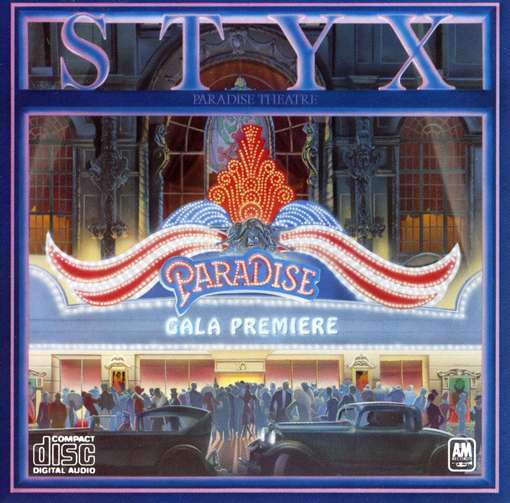
Paradise Theatre (1980)

1.A.D. 1928
2.Rockin' The Paradise
3.Too Much Time On My Hands
4.Nothing Ever Goes As Planned
5.The Best of Times
6.Lonely People
7.She Cares
8.Snowblind
9.Half-Penny Two-Penny
10.A.D. 1958
11.State Street Sadie
It’s tempting to view Paradise Theatre as the last truly great gasp of a band who had been carefully balancing rock accessibility with progressive ambition for the better part of a decade. This was their first number one album, and its release was accompanied by a lavish tour that shattered attendance records and brought the group firmly into the global spotlight. No longer just a “cult” band or classic rock also-ran, Styx had arrived.
Unlike Cornerstone, which hinted at division and stylistic uncertainty, Paradise Theatre finds the band branching in multiple directions at once—yet miraculously, holding it together. Dennis DeYoung’s long-held fascination with theatrical narrative and stage drama finds its most successful outlet here. The musical ambitions he would later explore more overtly (and divisively) are kept in check just enough to allow the rock band at the heart of Styx to remain visible. The result? An album that doubles as a concept piece, a radio-ready hit machine, and a cautionary tale about faded dreams and economic decay—all rolled into one.
“Tonight’s the night we’ll make history,” DeYoung intones in the opening suite, his voice polished yet urgent. It’s a bold statement—followed amusingly by “as sure as dogs can fly”—but we don’t doubt him. The metaphor of the Paradise Theatre, a real-life Chicago venue that closed its doors in the early '50s, is stretched skillfully across the album’s arc. America, too, was closing its golden age curtains. Rockin' the Paradise delivers the necessary punch—a brassy, affirmative track warning us that lean times are coming. Coming out of the disillusionment of the late 1970s, it was an anthem that many didn’t know they needed.
Tommy Shaw delivers his most iconic Styx moment with Too Much Time on My Hands, reportedly a last-minute addition, and possibly composed with one eye rolling. Still, it’s catchy, clever, and perfectly timed—a song that managed to sneak existential dread into Top 40 rotation without anyone noticing. DeYoung’s The Best of Times is the emotional centerpiece, deceptively upbeat on first listen but, like Come Sail Away before it, carries a melancholy that only deepens with repeated spins.
There are sonic experiments here too—Lonely People, She Cares, and Nothing Ever Goes as Planned all feature horn sections, stretching the band’s sonic palette without breaking it. The latter track in particular is a curious beast—DeYoung indulging his Broadway side, with a flair that feels more at home in a stage production than a rock record. That it mostly works is a testament to how dialed-in the band was at this moment.
James “J.Y.” Young steps up in the final act, with two of the album’s darker, harder-edged pieces. Snowblind is a standout—not just for its eerie vibe and anti-drug messaging, but for how hauntingly relevant it remains. Alongside Miss America, it solidified Young’s place as the band’s snarling conscience. The closer, Half-Penny, Two-Penny, is Styx at their most chaotic and gleeful. Part rock march, part political sermon, part vaudeville meltdown—it shouldn’t work, but somehow it does. It’s not hard to imagine it staged under Broadway lights, though the marching beat would sound just as good thundering through an arena.
And then we return to A.D. 1958. Just DeYoung and his piano. A wistful epilogue. The house lights are up, the curtains drawn, and the ghost of a dream drifts quietly into the dark. Paradise Theatre wasn’t just a hit—it was a monument. And even though the band’s internal fractures would soon deepen, leading to creative implosions, this album remains the finest balance they ever struck between art and commerce, bombast and intimacy.
History, indeed, was made.
Go back to the main page
Go To Next Review